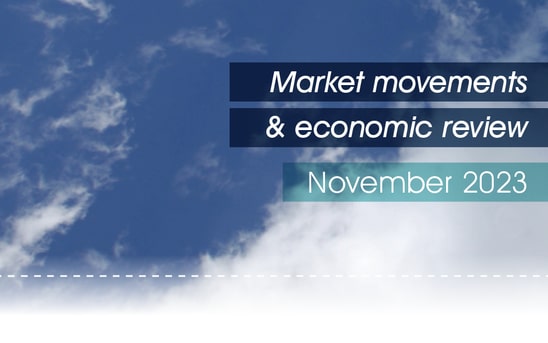
A slow and steady race to the 2023 finish line
Whichever way you look at it, the Australian property market is finishing the year on a fairly even keel. Values are on a slight upward trajectory, but it’s clear the head-turning price jumps of the recent past are now in the rear view mirror.
CoreLogic’s national Home Value Index (HVI) has reported a quarterly increase of 2.1%, but a monthly movement of just 0.6% – the smallest monthly gain since the growth cycle commenced in February. As December begins, the median dwelling price in Australia now sits at $753,654, up on the same time last year at $714,475.
Over the past three months the combined capitals figure just edged out the combined regions rising 2.2% to $827,659 compared with a 1.8% rise to a median of $602,645. A year ago, the capital median was $778,368 while the regional median was $578,506.
November shows a V-shaped recovery
Although prices have experienced a notable slowdown, CoreLogic’s national HVI reached a new record high in November. After a peak to trough fall of -7.5% between April 2022 and January 2023, housing values bounced 8.3% in just 10 months – what CoreLogic’s research director Tim Lawless said demonstrated a clear ‘V’ shaped recovery.
Figures show Perth with its 5.4% rise in values, as well as Adelaide and Brisbane both experiencing a 3.9% jump, are the clear quarterly standouts. Mr Lawless cited low stock levels as the reason behind the positive price performances. “This imbalance between available supply and demonstrated demand is keeping strong upwards pressure on housing values across these markets, despite the downside factors leading to weaker housing market conditions across the lower eastern seaboard,” he explained.
On the other hand, Darwin had the most negative quarter with a subtle -0.7% decline, Hobart only inched up 0.1% while Melbourne and Sydney moved by 0.6% and 1.8% respectively. “The Melbourne Cup day rate hike has clearly taken some heat out of the market, but other factors like rising advertised stock levels, worsening affordability and persistently low consumer sentiment are also acting as a drag on value growth in some markets,” Mr Lawless said, while adding Sydney home values had slipped into negative growth during the last week of November which could push Harbour City prices back by early 2024.
Luxury end looking lacklustre
Top end markets across our nation’s most expensive cities appear to be experiencing a wind down. CoreLogic reported seeing slower growth conditions across the upper quartile for Sydney and Melbourne as the priciest quarter of those markets is now showing the lowest rate of growth both on a monthly and rolling quarterly basis. This could be a sign of things to come. Historically, how the most expensive markets in Sydney and Melbourne track gives an insight into the future performance of the wider market.
“As borrowing capacity reduces, we may be seeing more demand deflected towards lower housing price points, with the broad middle of the market now recording the strongest rate of growth in Sydney and Melbourne,” Mr Lawless said.
Interest rate impact
Despite what was a surprise rise in the cash rate in November, PropTrack data shows national home prices have so far defied interest rate pressures. In fact, values lifted to a record high in November according to the PropTrack Home Price Index by REA Group.
Eleanor Creagh, senior economist at PropTrack, said although national home price growth slowed in November, spring offered increased choice for buyers. “Strong housing demand, buoyed by record net overseas migration, tight rental markets, low unemployment and home equity gains, has worked alongside limited housing stock to offset the impacts of higher interest rates this year,” she said.
“Despite interest rates climbing again in November and the flow of listings hitting the market increasing, housing demand has remained strong and national prices have now risen for 11 straight months.”
Whether the RBA will introduce yet another hike when it meets next week remains to be seen, but all signs point to a positive start to 2024 according to Ms Creagh.
“Looking ahead, price growth is expected to continue as the positive tailwinds for housing demand and a slowdown in the completion of new homes counter the sharp deterioration in affordability and slowing economy. However, prices are likely to lift at a slower pace than they have across 2023.”
Dwelling values over the quarter
Melbourne
Although the quarterly movement was 0.6% for all dwellings to a median price of $779,914, values are up 3% annually. The highest annual dwelling change was in the SA3 of Monash where there was an annual increase of 7.9% to a median of $1.247 million. Investors looking at the Victorian capital can expect an average gross rental yield of 3.4%.
Sydney
The Harbour City saw values increase by 1.8% over the quarter to a median of $1.125 million, but annually values are still up 10.2%. The Marrickville/Sydenham/Petersham SA3 in Sydney’s inner west saw the greatest dwelling value growth at 14.4% to $1.694 million. The average gross rental yield for Sydney is 3%.
Brisbane
Queensland’s capital experienced a healthy quarter of 3.9%, but a significant annual increase of 10.7%. Dwellings in the Nathan SA3 experienced the highest growth for the year to October 31 with a jump of 15.1% per cent. The median dwelling value in Brisbane is $779,270 and the average rental yield in the city is 4%.
Canberra
The median dwelling price in Canberra is still the second priciest in the country at $842,677 after a quarterly change of 1.1%, but an annual decrease of -0.3%. Molongo’s dwelling price increased 5.5% annually to $758,556 making it the highest performing suburb in the nation’s capital. Currently, rental yields in the city are at 3.9%.
Perth
The West Australian capital is still home to some of the cheapest metropolitan property in the country with a dwelling median of $646,520 (only behind Darwin’s $496,792). Values rose 5.4% over the past quarter and the annual growth is sitting at 13.5%. Perth’s rental yield is 4.6% and the suburb of Armadale saw the greatest annual change with a rise of 21.5% to a median of $551,197.
Note: all figures in the city snapshots are sourced from: CoreLogic’s national Home Value Index (December 2023)
To find out how you might be able to purchase a property in the current market, reach out to your trusted broker today.
If you have any questions or need any information please give us a call on 039723 0522.




